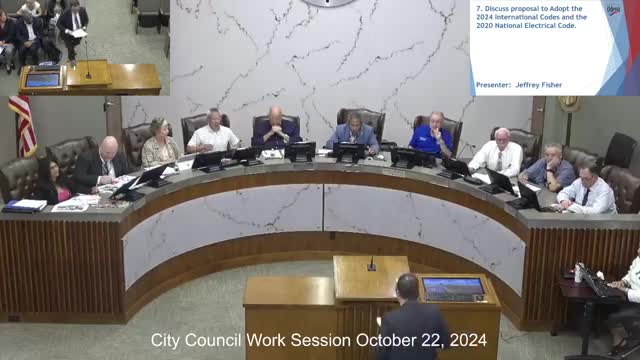City staff present proposal to adopt 2024 ICC codes and 2023 NEC; council raises supply and enforcement concerns
Get AI-powered insights, summaries, and transcripts
Subscribe
Summary
City staff and the fire marshal recommended updating Odessa’s building and fire codes to the 2024 International Code Council standards and adopting the 2023 National Electrical Code, citing public‑safety improvements and grant eligibility; council members asked for phased implementation and local outreach.
City staff and the fire marshal presented a proposal to adopt the 2024 International Code Council (ICC) model codes and the 2023 National Electrical Code (NEC), explaining the proposed change, expected benefits and concerns raised by council members and local industry.
Staff said the ICC codes are updated every three years and that updating the city’s code would improve public safety, increase access to federal and state grants (including FEMA disaster‑mitigation and recovery programs), and yield longer-term cost savings and insurance advantages. Staff advised adopting a regular automatic three‑year update cadence (2027 next update for ICC; 2026 for NEC) so Odessa’s requirements remain current with national standards.
The fire marshal described fire‑code changes in recent cycles—improved detection and alarm standards, updated egress requirements, stricter rules for high‑hazard areas, enhanced fire department access requirements and new guidance for battery‑storage and alternative‑energy installations—and recommended adopting the newer fire code updates.
Council members expressed concerns about supply availability and whether local contractors and suppliers can meet the new technical requirements immediately. One council member urged phased implementation and expanded outreach to local builders, contractors, community colleges and trade suppliers to avoid disruptive “special‑order” requirements that could stall construction. The fire marshal and staff said many products are available but acknowledged local lead times and recommended outreach and education for builders and homeowners.
On existing buildings, staff said the International Existing Building Code would handle preexisting structures: existing occupancies are allowed to remain under prior standards until they undertake renovations, additions or changes that trigger code upgrades. Council members pressed staff for town‑hall-style outreach for both contractors and residents and for clearer implementation timing. Staff agreed to reconvene with development staff to build a timeline, consider phased adoption and host outreach sessions before formal adoption.
No council vote occurred during the work session; staff proposed bringing a proposed ordinance and an implementation plan (including outreach and timing options) to a future meeting for council consideration.
